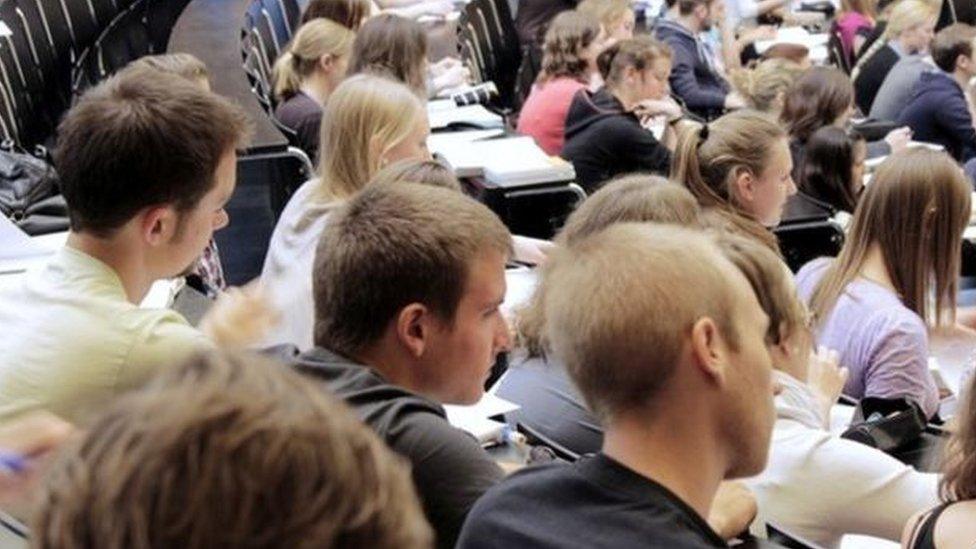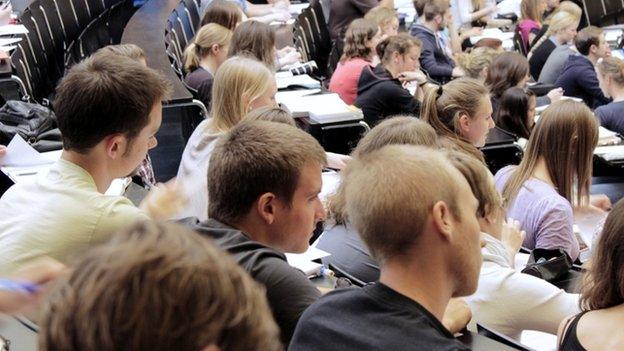Scots students face 'shocking' university access gap
- Published
Scots students are less likely to go straight to university, while half who go via college repeat at least one year
Young Scots from disadvantaged areas are four times less likely to go to university than those from wealthy backgrounds, researchers have found.
Their study showed 90% of growth in higher education places for disadvantaged students came from colleges, not universities.
The Sutton Trust said its findings showed a "shocking access gap".
The Scottish government said university access for students from poorer areas was up by 29% since it came to power.
In England, those from the poorest neighbourhoods are 2.4 times less likely to attend university than people in the richest areas.
Those in Northern Ireland and Wales are three times less likely to do so.
'Strong push'
The Sutton Trust is now calling for the urgent appointment of a new independent commissioner for fair access to tackle the problem.
Trust chairman Sir Peter Lampl said: "Scotland faces a shocking access gap and it is vital that the government appoints a strong independent commissioner without delay.

The Scottish government said university access for students from poorer areas was up by 29% since it came to power
"There is good practice in Scottish universities on access, but we need a really strong push if talent is not to be wasted."
Analysts found, over the past decade, Scots were more likely than their English counterparts to enter higher education.
But they are less likely to go straight to university, and half who go via college repeat at least one year.
In 2013-14, 55% of Scots entered higher education by the age of 30, 34.1% straight from school and 20.9% going to college first.
In England, 46.6% entered higher education, with just 6% starting at colleges and other non-university providers.

Analysis by Branwen Jeffreys, education editor
It was, said Alex Salmond, as he unveiled a stone monument at Heriot-Watt University, his administration's "biggest achievement".
The abolition of tuition fees certainly set Scotland on a different path, and the monument has locked the SNP into its flagship policy.
There's no doubt it has saved hundreds of thousands of students from repaying debts out of their graduate salaries.
But, as a detailed analysis published today shows, there is little evidence it has propelled many more working class Scottish students into university.
Read more from Branwen here.

Prof Sheila Riddell, who led the study, said it highlighted the "over-reliance on the Scottish college sector to increase participation rates overall" and the failure of Scottish university places to keep up with increasing demand.
She said: "Despite free tuition, the Scottish university sector has much work to do in order to realise the goal of fair access."
'More to do'
Education Secretary John Swinney told BBC Radio's Good Morning Scotland programme: "What's happened over the last nine years is that there has been a 29% increase in people from the most deprived areas in Scotland going into higher education.
"The report does talk, of course, about the gap in participation from young people from the most and least deprived areas accessing higher education, but it also makes the point that the gap in Scotland has closed more quickly than it has in other parts of the United Kingdom.
"I would be the first to acknowledge that there is more that we have to do to improve access to higher education in Scotland and that is exactly what the government is committed to do, but we have made important progress in the last nine years."


The cost of university
People who live in Scotland pay no tuition fees to go to university in Scotland
English students at university anywhere in the UK can pay up to £9,000
Across the UK, the average salary for young graduates was £24,000 in 2015 - £6,000 more than for non-graduates
3.1% of graduates were unemployed last year, compared with 6.4% of non-graduates

A Scottish government spokesman said some of the findings in the report were "based on misconceptions that do not accurately reflect the position" north of the border.
He said the report failed to take account of the fact that a significant proportion of higher education in Scotland takes place in colleges.
"When participation in college is factored in, the Scottish higher education participation rate is significantly higher than in England," he added.
Scottish Conservative education spokeswoman Liz Smith said the "limited progress" in Scotland partly reflected lower bursaries.
She said: "These are matters for the SNP to address urgently, most especially in light of its policy to force universities to take 20% of their intake from disadvantaged communities by 2030, and because of recent reports which shine a light on the dangers of Scottish universities lagging behind in the finance that needs to underpin cutting edge research and innovation."
Scottish Labour education spokesman Iain Gray said the report "shows definitively that Scotland lags behind the rest of the UK when it comes to university access for students from poorer families".
'Greatest barriers'
He added: "The SNP record on colleges - 152,000 fewer college students, poor student support and botched mergers which staff say has done nothing to improve teaching - is letting down many of the poorest students who can get into higher education."
Susan Stewart, the director of the Open University in Scotland, said discussions about access to higher education should not be limited to school-leavers.
"Part-time study is ideal for people who have families or other caring responsibilities, who are in work but on lower incomes, or who have a disability, and means that they don't miss on the benefits that higher education has to offer. We can't widen access with a narrow focus," she said.
EIS general secretary Larry Flanagan said: "Scotland has a strong education system at school, college and university level but it is a sad truth that the greatest barriers to young people maximising their educational potential continue to be poverty and low family income.
"Whilst a significant amount of access to higher education is provided by colleges, which is a positive, Scottish universities need to do more to widen access to young people of all backgrounds."
- Published27 May 2016
- Published18 June 2015
